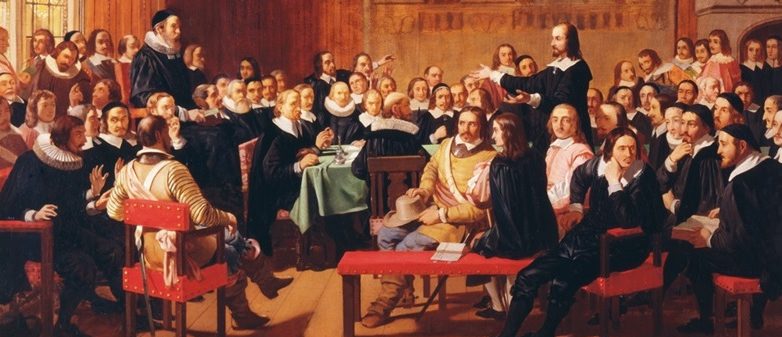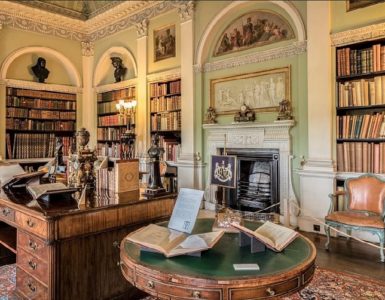William was born in Cumberland County, Virginia to Joseph and Joanna (Read) Hill, March 3, 1769. His father died when he was about five years old and after a few years his mother remarried. Her new husband was a widower named Daniel Allen who was an elder in a Presbyterian Church in Cumberland County and his son Cary became a Presbyterian minister. When he was just ten years old William’s mother died and the following year his step-father hired Drury Lacy to tutor him in preparation for college studies.
Even though William tended to carelessness and indifference about his studies, Lacy was able to teach him discipline and develop his curiosity for knowledge. In 1785, he entered Hampden Sidney College during the presidency of John Blair Smith. The United States was in its first years as a nation and there was not only a strong sense of independence from British rule but also a rebellious sense of independence from God and religion. As Hill began his college program there was little regard for Christianity on campus and it was rare to see a student in possession of a Bible. During the first few years of college he suppressed the knowledge of God in unrighteousness and indulged freely in campus and community worldly amusements. During Smith’s presidency there was revival among the students and Hill joined with other students for joint devotions and times of prayer, but some of his classmates continued in their rebellion and were abusive towards Hill and his praying friends. The revival extended into neighboring churches and the community. One of the students who came to Gospel grace was Nash Le Grand who became a teacher at Hampden Sidney and a minister.
It was during the summer of 1787 that Hill made his public profession of faith in Christ and the following summer he graduated Hampden Sidney. He remained on campus studying theology with President Smith and was licensed to preach the Gospel by the Presbytery of Hanover, July 10, 1790. For the first two years of his licensure he was a missionary whose field included Chesapeake Bay, the counties in the west of Virginia to the Blue Ridge, from Tennessee to Maryland, and the counties of the lower part of the Shenandoah Valley. He then settled in Berkeley County (now Jefferson County) where he pastored the Charlestown and Hopewell Churches. In October 1792, Hill and Nancy, the daughter of Colonel William Morton of Charlotte County were married.
Hill’s next call was to the Presbyterian Church in Winchester, Virginia, where he was installed in January 1800. During this call he was elected moderator of the Presbyterian General Assembly meeting of 1821 held in Seventh Presbyterian Church, Philadelphia. Included among the items of business were—approval of the revised Form of Government, forms of process, and amendments to the Directory as they had been sent down to the presbyteries in 1820; a committee recommendation to confer with the Associate Reformed Church about union which was adopted by both denominations and sent down to their respective presbyteries for approval; the Synod of New York and New Jersey, as well as the Synod of North Carolina combined with the Synod of South Carolina and Georgia resolved to endow professorships at Princeton Seminary (two total); the appeal of William Vance from the decision of his presbytery judging his marriage to his deceased wife’s sister incestuous was referred to a committee for study following “a long discussion” and the committee’s report referring the case back to the church session was adopted; the judicatories needed direction for leading their meetings so forty-three “General Rules for Judicatories” were adopted; Charles Hodge was hired at Princeton Seminary to be “a teacher of the original languages of Scripture” for no more than 400.00 per year; and a committee recommendation to print a new edition of the Confession of Faith and Constitution of the Presbyterian Church (both in one volume) was approved and Ezra S. Ely was appointed to procure the copyright. It was a busy meeting extending from May 17 to 31 with two Sabbaths excluded from sessions. Added to Hill’s gavel wielding duties was preaching the annual missionary sermon in the evening of May 21. When Moderator Hill returned to Seventh Church for the Assembly in 1822, he delivered his sermon on Romans 16:17, “Now I beseech you, brethren, mark them which cause divisions and offences, contrary to the doctrine which ye have learned, and avoid them.” The subject for the sermon was appropriate given events that would take place in his ministry in later years.
After thirty-four years in Winchester in February 1834, William Hill accepted a call to the Briery Presbyterian Church in Prince Edward County but remained only two years before accepting a call to the Second Presbyterian Church in Alexandria. This is where Romans 16:17 enters the picture. The verse warned of divisions within the church. Hill left Briery Church because he became a member of the New School when the Old and New Schools separated in 1837. Briery Church had remained with the Old School in the Presbytery of West Hanover, but the Alexandria Church was in the District of Columbia Presbytery of the New School. After two years in Alexandria he resigned retiring from active ministry due to increasing health problems. He returned to Winchester to live out his last days.
While in Alexandria, Hill had started writing a book on the history of Presbyterianism in the United States, but he redirected the emphasis of his book from a general narrative history to aiming his text at Charles Hodge and his Constitutional History of the Presbyterian Church, 1839 (see notes). Hodge contended that American Presbyterianism was founded on what Hill described as the strict model from Scotland, which Hill disagreed with believing instead that Presbyterianism was not so restrictive. Hill’s book, A History of The Rise, Progress, Genius, And Character of American Presbyterianism, 1839, offered a more encompassing definition of Presbyterianism.
By the term American Presbyterianism, I mean one who decidedly prefers the Presbyterian system of government to Prelacy or Democratic Independency, but not to the extent of setting up claims, with its jure divino and exclusive pretensions, so as to refuse intercourse, fellowship, or tolerance with any other system but it’s own. It is Presbyterianism more upon the principle of expediency than of Divine right, which excludes expediency altogether. (page 98)
For Hill, polity was a thing indifferent; polity is a matter of choice with one version just as good as another. In the days of the Puritans and their debates with the Church of England the word adiaphora, from Greek meaning things indifferent, was used in the debates about polity, liturgy, and other contested issues. Later in his book Hill elaborated further.
The outline, or platform, of Presbyterianism to be gathered from Scripture, embraces a few plain essential and fundamental principles only, leaving the filling up of the minute details to human expediency and a wise discretion. A Divine right can be pleaded for a few indubitable fundamental principles only. It was left to human sagacity and discretion to adopt the expedients to be employed. This leaves the door open for tolerance and forbearance in lesser matters. In essentials, unity—in non-essentials, liberty—in all things, charity. This I take to be American Presbyterianism in contradistinction to the rigid, exclusive, sectarian Scotch system. Beginning with a Presbytery claiming a Divine right within plain Scripture limits only, and human expedients according to our best judgments in smaller matters, with full liberty of conscience to others to judge for themselves without incurring molestation or civil disabilities for so judging—beginning with a Presbytery, and working upward to Synods when necessary, or to General Assemblies as long as they shall work advantageously, and no longer, as these are not essential to the Presbyterian system—so the Mother Presbytery [the first presbytery in America], after awhile, resorted to the expedient of a Synod, and afterwards to a General Assembly, to be kept within the prescribed limits of a written constitution, formed for their rule and subject to such changes and amendments as Presbyteries, from time to time, shall judge necessary. Under such a government it arose and spread its branches far and wide, and covered the hills. (page 119)
Reading these excerpts from a twenty-first century perspective with considerable debate about confessional subscription having ensued since Hill’s and Hodge’s books were published, it might be thought that Hill was pulling for system subscription (or, essential subscription) against a form of full subscription as he believed was represented by Hodge’s view. However, calling Hill a system subscriptionist would be giving him too much credit because what he contended for was similar to John Robinson and the Pilgrims congregational-separatist-dissenters form of government. He was contending for a congregational form of church government led by ministers with elders as their helpers and connectional relationships with higher judicatories were limited, at best. For Hill, the strength of his view of presbyterian polity was the minister and elders of the congregation.
A few months before his death, William Hill suffered a severe illness resulting in his being bedridden for two weeks before he died November 16, 1852. His funeral was preached by the Rev. A. H. H. Boyd, D. D. Nancy predeceased him May 26, 1851. Their household had been enhanced by the birth of two daughters. In 1816, the honorary degree of Doctor of Divinity was given him by Dartmouth University.
Dr. Hill’s publications include—A Sermon, Delivered in the Presbyterian Meeting-House in Winchester, on Thursday the 23d Jan. 1812, Being a Day of Fasting and Humiliation, Appointed by the Citizens of Winchester On Account of the Late Calamitous Fire in The Richmond Theatre, 1812; Ministerial Parity, or An Equality of Grade, Office, and Authority Among the Christian Clergy Vindicated and Proved in a Sermon Delivered in Winchester, October 31st, 1819, at the Opening of the Synod of Virginia by Rev. William Hill, D.D. Pastor of the Presbyterian Church, in Winchester, Virginia, 1819; As noted in the biography is Hill’s A History Of The Rise, Progress, Genius, And Character Of American Presbyterianism, 1839; and Autobiographical Sketches of the Revd. Dr. William Hill, Together with his Account of the Revival of Religion in Prince Edward County, Union Theological Seminary Historical Transcripts No. 4, Richmond, 1968, which includes in its content a preface, Hill’s journal of missionary work from July 1, 1790 to January 16, 1792, and an addendum.
Barry Waugh
Notes—The header is of a painting of the Westminster Assembly as provided courtesy of Reformation Art. Charles Hodge’s The Constitutional History of the Presbyterian Church was first published in two parts in 1839 with Part 1 covering the years 1705-1741 and Part 2 covering 1741-1788; the set addresses the growth of the Presbyterian Church in the United States of America from its first presbytery, 1705, through the Old Side-New Side division and reunion, to the last meeting of the Synod of New York and Philadelphia before the first meeting of the General Assembly in 1789. Sources used include—Sprague’s Annals, vol. 3; McClintock and Strong, Cyclopedia of Biblical, Theological, and Ecclesiastical Literature, vol. 4; Alfred Nevin, Encyclopedia of the Presbyterian Church; James R. Graham’s The Planting of the Presbyterian Church in Northern Virginia Prior to the Organization of Winchester Presbytery, December 4, 1794, 1904; Cynthia Jo Ingham, “Set at Liberty: Virginia Presbyterianism after the Revolution,” Journal of Presbyterian History 79:4 (Winter 2001), 243-55; Old Briery Church, Prince Edward County Virginia, 1828, a 1971 reprint of a 1907 reprint. Also used is the New School’s version of American Presbyterianism published by E. H. Gillett, History of the Presbyterian Church in the United States of America, Revised Edition, 2 volumes, Philadelphia: Presbyterian Board of Publication, 1864. The published Old and New School General Assembly minutes are available online; note that the New School can be recognized by their New York publication while the Old School minutes were published in Philadelphia.





